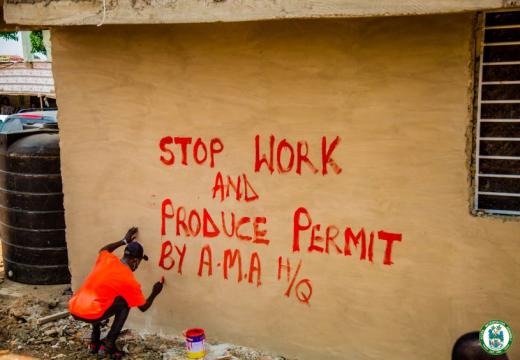How To Acquire A Building Permit In Ghana: The Requirements And Cost Involved
How To Acquire A Building Permit In Ghana: The Requirements And Cost Involved
- by PropHunt Admin
- On 23-09-2022
- at 8:48 AM

Building codes are often in place to guarantee that construction work complies with minimum constructional requirements, energy conservation standards, and occupant health and safety standards.
As a result, Ghana's National Building Regulations (NBR) (L.I. 1630) were passed in 1996 to govern the construction of buildings, the modification of building structures, and the execution of works or the installation of fixtures in connection with any building throughout the nation.
What is a national building regulation?
The national building regulations are a legislative instrument (L.I.) which is a set of rules and standards that must be followed to satisfy the minimum acceptable levels of safety for buildings and non-building structures in the country.
In the case of Ghana, the L.I. mandates the District Planning Authority (DPA) to implement the regulations on behalf of every local authority.
The DPA however, appoints a qualified building inspector who oversees and inspects daily work on buildings, erections and installations to ensure compliance with the requirements of the regulations.
Application of the national building regulation in Ghana
The national building regulations (NBR), in this case, a ‘building permit’ is applicable to the erection, alteration or extension of any building in the country. What then is a building permit?
Building Permit
Building permits are the formal document that grants you permission to build a new building or make changes to existing construction (Renovation). A building permit enables the construction of buildings or other structures on the condition that the building code is followed.
According to the L.I. 1630, anyone who intends to:
-
Erect any building, or
-
Make any structural alteration to any building, or
-
Execute any works or
-
Install any fittings in connection with any building
Must apply to the District Planning Authority for a building permit and submit the relevant plans in duplicate.
Requirements for getting a building permit in Ghana
In order to acquire a building permit in Ghana, the applicant must first satisfy the District Planning Authority (DPA) that he has a good Title to the Land seeking to develop.
This will be determined by the certificate issued by the Chief Registrar of Land Titles or other agencies so authorized.
The following is the list of documents to submit to the District Planning Authority and any other particulars as the DPA may consider necessary:
-
Building Permit Application Form - one(1) copy
-
Title Search - one (1) copy
-
Indenture or Deed of assignment or Land Title Certificate - one (1) Copy
-
Building plans four(4) copies
-
Structural Drawings four(4) copies)
-
Structural Calculation Report four(4) copies)
-
Fire Report three(3) copies
-
Mechanical or Services Drawing four(4) copies
-
Geotechnical Report Structural Integrity Report three (3) copies
-
Environmental Permit one(1) copy
-
Traffic Impact Assessment (T.I.A) (three (3) bound copies)
-
Hydrological Services Report (if requested) (three (3) bound copies)
Details of the building plan to submit to DPA
The plans submitted are to indicate Sections, elevations, calculations and drawings, and other material specifications. The L.I. requires that the plans, sections and elevations submitted must be prepared by a person qualified to design the type of building.
The plans should:
-
Be prepared in ink or otherwise in a permanent manner and on a suitable durable material
-
Be to a scale of not less than 1:100, or if so extensive not less than 1:200
-
Include the plan of every floor and complete sections of foundations and every storey, floor and roof of the building
-
Differentiate clearly between new and existing work – for work on an existing
The applicant must also submit a certificate prepared by a Licensed Surveyor to show that the corners of the plot have been demarcated on the ground in a permanent manner in accordance with the site plan.
A building or group of buildings (120m2 and 2 storeys and above) shall be designed by:
-
An architect
-
A civil engineer
-
A structural engineer
-
A professional builder
Location of the building
Regulation 13 provides that the following site requirements must be satisfied in order for building permits to be approved in Ghana:
-
Buildings shall not be erected over areas which have been reclaimed
-
No site liable to flooding shall be built upon without adequate provision for flood control
-
Buildings shall not be erected over drains, culverts, watercourses, high tension cables, or sewer
-
Any site for the erection of a building for human habitation must be adequately protected against dampness
Site Coverage of Buildings must comply with the following conditions, according to Regulation 13, in order for your building permit application to be accepted.
-
The plot shall not be less than 450m2 (or 330m2 where the plot is entirely surrounded by roads or lanes) for a dwelling house with a frontage of 15m
-
No dwelling house shall cover more than (Single storey detached 50%, Two and three storey detached 40%, Single storey semi-detached 60%, Two and three storey semi-detached 50%)
-
Provided that the total floor area of a residential building shall not exceed 80% of the plot area.
-
Business premises shall not cover more than 75% of the plot area – with provision made for loading, car parking, and accommodation.
Spatial requirements and dimensions
Spatial requirements and dimensions in regulation 19 apply to dwellings intended for use on a continuous basis as the principal residence of the occupant and include the following:
-
Dimensions are to be measured between finished surfaces
-
Minimum floor areas do not include closets or built-in bedroom cabinets
-
Areas are considered as combined if the separating wall covers less than 60% of the separating lane
-
Heights (minimum) of rooms and spaces are provided in Schedule 2
-
Width of a hallway shall be at least 900mm
Building permit cost in Ghana
The cost of getting a building permit in Ghana varies depending on the usage of the land. Be it residential or commercial there is a charge associated with submitting building permit plans at each stage of the application procedure. At each stage of the application process for a building permit, the fees must be paid. These costs could change according to the district of residence.
For a fair idea of how much cost involves, let's consider what happens at the Accra District Planning Authority when applying for a building permit.
-
Building or development permit form – GHS 100
-
Processing of documents – GHS 50
-
Site inspection requirements – GHS 100
-
And other professional costs associated with the application
The length of time it takes to obtain a building permit in Ghana depends on how quickly you need it. The complete process of getting over the permit may be less than one week, though it may occasionally take longer than three months.
Also, how quickly you obtain a building permit in Ghana will be determined by other professional fees you pay because most of these individuals work as government employees who can expedite the application procedure for you.
The steps on how to acquire a building permit in Ghana
The legal criteria for obtaining a building permit in Ghana mandate that both locals and visitors adhere to the established procedures in order to accomplish so. Let's go over the procedures for obtaining a building permit in Ghana.
Step 1. Pick and complete an application form
Preparing the permit application is the first step in requesting building permission in Ghana. You have to pick a form from the District Planning Authority, fill it out, and include all building plans as required.
Attached are all the following documents as required by the local authorities (Source: Accra Metropolitan Assembly)
- Submit your full set of applications to the Physical Planning Department
- Attach completed land ownership document from Lands Commission
- Attach four copies of architectural drawings signed by a certified Architect
- Attach four copies of structural drawings signed by an Engineer
- The proposed development must conform to the zoning status
- A certified soil test report
- Fire certified report including drawings from the Ghana National Fire Service
- Environmental Protection Agency Permit
- Structural integrity report in case construction development has already commenced or is completed
Depending on the usage, size, and type an applicant may be asked to provide additional information.
Step 2. Application review
Every permit application must go through a review process and the local authorities usually call it vetting. There are three layers of vetting that need to be finished before a building permit may be issued. vetting by the Physical Planning Department, the Works Department, and other relevant departments considering the sort of structure you are developing.
Depending on the type of building you’re erecting you may be required to make changes to the application after review and resubmit it to the DPA for further assignments.
Step 3. Site inspection
A building inspection officer will visit the property to conduct a site inspection now that the application has been thoroughly reviewed. Inspectors typically spend only a few minutes on a property, checking for smoke detectors, checking for floods, and making sure everything is measured and secured properly before leaving.
Step 4. Assessment and recommendation
The site inspector will look at your residential renovation plan before approving or disapproving it. This will be followed by an evaluation and any necessary recommendations to the SPC based on the inspection done.
Step 5. Decision on application
After all the prerequisites have been satisfied, it is decision time. The entire submission will be evaluated and taken into consideration by the SPC. The application will either be accepted, refused, or put on hold for later review if all requirements are met.
Step 6. Issuance of a building permit
If approved, the applicant receives a building permit in Ghana from the licensing office and will issue you an official permit certificate. Once you start your work, you need to submit it to your building inspector, then they will approve it.
Summary
Keep in mind that each building permit has an expiration date. The building permit that has been issued will make this obvious. Therefore, it will be easy to comprehend the permit itself, and if for some reason you need more time, you may file a request, follow the procedures, and supply the information that is required.

 French
French




